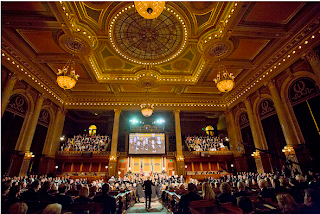Des Moines, Iowa (Oct. 18, 2013) -- The 2013 World Food Prize Laureates - recognized as the original pioneers of agricultural biotechnology - today addressed a crowd of over 1,000 colleagues and others at the World Food Prize Borlaug Dialogue, urging the world to advance biotechnology to help feed the growing population.
Video footage of their remarks today at the Laureate Luncheon is at this link (starting at the 1:04 time mark).
 |
| Credit: The World Food Prize |
Quotes from their remarks at the Laureate Award Ceremony last night:
Mary-Dell Chilton:
"Our work, which began as curiosity-driven, fundamental research, now finds worldwide application in agriculture with great promise of benefitting all mankind. Nothing could be more gratifying than that.”
“The choice of plant biotechnology researchers for the World Food Prize 2013 recognizes the valuable contribution of this science to agriculture. When I began this work, I scarcely could have imagined the profound effect it would have on agriculture today. Neither could I have imagined the controversy that has accompanied our discoveries and advances. It is my hope that we can put to rest this misguided opposition and convince the public of the safety, benefit, and ecological value of this new and useful technology. It is a wonderful tool for plant breeders to help them grow food for a hungry future. We will need it.”
 |
| Credit: The World Food Prize |
Robert T. Fraley:
“I’d also like to thank the selection committee, Ambassador Quinn, and Mr. Ruan for recognizing biotechnology. That took courage. And we really appreciate the forum that it provides to have this really important discussion about the role of innovation in technology and in agriculture.”
“I’d like to accept the award on behalf….of the plant scientists across the industry and academia who have worked so hard to get us to this point and importantly are going to work so hard to get us to where we need to be in the future.”
“It just seems like yesterday that I was in the laboratory…trying to figure out how to put genes into petunia plants and now we’ve got biotech crops growing in 30 countries around the world. And there’s so much more potential to come. We’re going to need it because we need to double the food supply to feed 9 billion people by 2050. I think we can do it. But it’s a tremendous challenge. And it is the greatest challenge facing us and all mankind in the future.”
“You know, I think if Dr. Borlaug were here this evening he’d be pretty proud of the scientific progress we’ve made. And then the first thing he would ask is, ‘How are we doing on that rust gene in wheat?’ And then he’d ask me, ‘Now how does that drought gene really do this year in field trails?’ And before he did anything else, he would look around and he would probably have a conversation with every student who’s in this beautiful place, because he loved youth. And then it would take about that long (snaps fingers) and Norm would say, ‘We’ve got a lot of work to do, let’s get on with it.”
Marc Van Montagu:
“I’m very, very grateful to the World Food Prize Foundation that they have recognized plant genetic engineering as a tool that will bring and that has already proven that it can bring progress for feeding those who need it most. But I’m frustrated, of course, that it takes so long. So long before this technology can help those who need it most.”
"And I hope that with the effort that the foundation has done, with the former laureates and with all the colleagues that are here, that we can mobilize to explain why it is needed. And I just want to stress that it’s – the fact that from fundamental research, looking how in nature bacteria makes transgenic plant, that that start must – should for many bring – that it is the priority to do outstanding fundamental research and be ready and that we should have the structures, that this science can then be applied. And for that, people in fundamental research should have close, close links with breeders. And that is what here at the World Food Prize is present. That breeders and the hope that the molecular biologists with the breeders can act better for making the products."
A recording of the 2013 World Food Prize Laureate Award Ceremony is available at this link.
Bios are available at www.worldfoodprize.org/laureates.
ABOUT THE WORLD FOOD PRIZE: The World Food Prize was founded in 1986 by Dr. Norman E. Borlaug, recipient of the 1970 Nobel Peace Prize. Since then, The World Food Prize has honored outstanding individuals who have made vital contributions to improving the quality, quantity or availability of food throughout the world. The Prize also hosts the annual Borlaug Dialogue international symposium on global food security issues and a variety of youth programs that aim to inspire the next generation to work in the fields surrounding global agriculture.
Media Contact: Megan Forgrave, Director of Communications, mforgrave@worldfoodprize.org or 515-229-1705 (Cell)
Contact information: The World Food Prize Foundation , The World Food Prize - CST, 666 Grand Ave Ste 1700, Des Moines, 503092500

No comments:
Post a Comment
Note: only a member of this blog may post a comment.